学位英语汉译英补充练习2特殊句型和时态
成人本科学位英语——英汉互译练习及解析
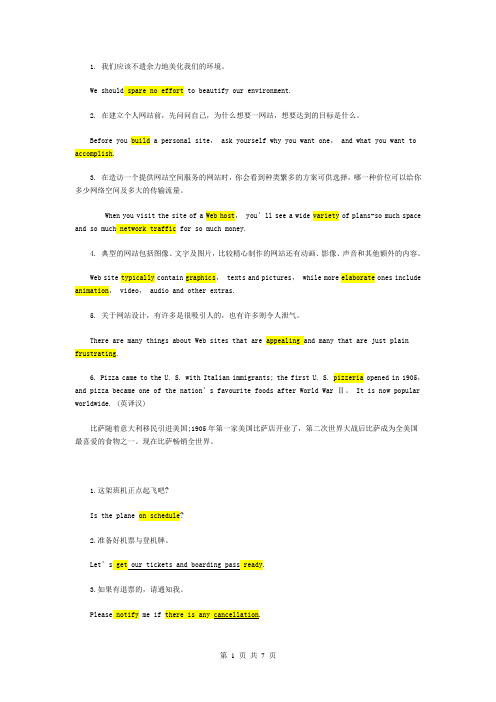
1. 我们应该不遗余力地美化我们的环境。
We should spare no effort to beautify our environment.2. 在建立个人网站前,先问问自己,为什么想要一网站,想要达到的目标是什么。
Before you build a personal site, ask yourself why you want one, and what you want to accomplish.3. 在造访一个提供网站空间服务的网站时,你会看到种类繁多的方案可供选择,哪一种价位可以给你多少网络空间及多大的传输流量。
When you visit the site of a Web host,you’ll see a wide variety of plans-so much space and so much network traffic for so much money.4. 典型的网站包括图像、文字及图片,比较精心制作的网站还有动画、影像、声音和其他额外的内容。
Web site typically contain graphics, texts and pictures, while more elaborate ones include animation, video, audio and other extras.5. 关于网站设计,有许多是很吸引人的,也有许多则令人泄气。
There are many things about Web sites that are appealing and many that are just plain frustrating.6. Pizza came to the U. S. with Italian immigrants; the first U. S. pizzeria opened in 1905,and pizza became one of the nation’s favourite foods after World War Ⅱ。
成人学位英语语法汇总

第一节动词的时态一、一般现在时:1、由when、as soon as、the minute、the moment、till、until等引起的时间状语从句,以及由if、unless、provided that等引起的条件状语从句常常用一般现在时态表示将来的动作,而主句则用一般将来时态.例:They will go home for winter vocation as soon as they finish their exams.2、当表示普遍的真理或者众所周知的客观事实,常常用一般现在时态.例:Theearth is round.地球是圆的.二、一般过去时:区分三个短语的用法:1、used to do sth:过去常常做某事.2、be/get used to doing sth:习惯做某事.3、be used to do sth:被用于做某事.三、一般将来时:1、be to+动词原形:表示安排或计划好了的动作.例:The Third-Ring Road isto be open to traffic before National Day.2、be about to+动词原形:表示即将发生的动作.例:The lecture is about tobegin.讲座即将开始.3、一些表示动作趋势,如开始、终结,以及一些表示动作方向,如往来的动词,常常用现在进行时态表示按照安排将于将来发生的事情,这类动词常见的有如:start, go, leave, come, arrive等.例:We are leaving for Beijing tomorrow.我们明天动身去北京.四、进行时态:重点区分when和while引起的时间状语的用法.When表示时间上的点,在考试中其引导的时间状语从句多翻译为“这时…”,主句多用进行时态;while引导的时间状语从句多翻译为“正当…时”,该从句用进行时态.例:One of the guards was sleeping when the general came in, which made him very angry.I fell and hurt myself while I was playing tennis.五、现在完成时:重点区分havehasbeen to:某人去过某地,表示一种经历,强调状态,可以和once, twice, often, never, ever连用;Havehas gone to:某人在去某地的途中或已在某地,强调动作.此句型不能与上述时间状语连用.例:He has gone to America.他已经去了美国.He has been to America twice.他去过美国两次.六、过去完成时:1、强调一个动作发生在另外一个过去的动作之前时,用过去完成时.2、It was the first/second/last time that…,在该句型,that从句用过去完成时态.七、将来完成时:常常标志性地由by、by the time、by the end of引起一个表示将来时间段的时间状语,主句用将来完成时态.第二节感官动词、使役动词的用法及英语中常考的两个句式结构一、感官动词的用法及其被动语态:在英语中,常见的感官动词有“五看二听一感觉”see、watch、look、notice、observe;hear、listen to;feel,在主动语态中用动词原形或现在分词作宾补,如see sb do/doing sth,改为被动语态时则要加to,如sb be seen to do sth.二、使役动词的用法及其被动语态:在英语中,常见的使役动词有make、let、have,在主动语态中用动词原形做宾补,如make sb do sth,改为被动语态时则要加to,如sb be made to do sth, 两种形式都表示使/让某人做某事的意思.例:We were made to study hardy.我们被要求努力学习.三、英语中常考的句式结构一:sth need/ want/ require doing 某物需要…=sthneed/want/require to be done此句式主语为物例:My room is a mess. It needs tidying up整理.四、英语中常考的句式结构二:have/get sth done 请/让别人做某事have/get后接宾语为物例:I have taken many photos. I’m going to get the film developed.五、情态动词的被动语态,其构成为:情态动词+be+过去动词.例:The work must befinished before lunch. 这项工作必须在午饭前干完.第三节情态动词常见的情态动词有can、could;may、might;must、need;should;ought to,对于情态动词常考其两方面的内容,一是情态动词用于推测句型,二是情态动词用于虚拟语气该部分的讲解放在虚拟语气一、情态动词用于对现在内容推测的常见句型有:1、Can/may do sth:表示对现在内容的可能性的推测;2、Must do sth:表示对现在内容的肯定性的推测.二、情态动词用于对过去内容推荐的常见句型:1、can/may have done sth:表示对过去内容的可能性;2、must have done sth:表示对过去内容的肯定性的推测.例:1、Mr Green must have failed to receive my letter, otherwise he would have replied.2/ I believe he must have had an accident, otherwise he would have arrived on time.第四节虚拟语气虚拟语气表示与客观事实相反的假设,由if虚拟条件从句和主句构成.一、虚拟语气的基本内容根据虚拟与其这种与事实相反的假设所对应的时间不同,虚拟语气的if虚拟条件从句与主句的谓语动词分别有三类构成形式:例:1、I wouldn’t talk that way if I were Peter.2、If the whole operation had not been planned before hand, a great dealof time and money would have been lost3、Jean doesn’t want to work right away because she thinks that if shewere to get a job she probably wouldn’t be able to see her friends very often.4、I would ask George to lend us the money if I knew him.5、Do you think there would be less conflict战斗、斗争 in the world ifall people spoke the same language.6、If Bob had come with us,he would have had a good time.二、if的省略形式又称虚拟语气的倒装结构在if虚拟条件从句中,如果谓语部分包含were,should,had等词,则可以把这些词放到主语前,省略if,构成虚拟语气的倒装结构.三、主句与从句时间不一致时虚拟语气的构成当虚拟语气的if虚拟条件从句和主句的动作发生的时间不一致时,要根据各自表示的时间采用对应的虚拟语气的构成形式.例:1、If I had attended the meeting yesterday, I would know what happened now.2、If you had taken our advice at that time, you would not be in trouble now.四、主观倾向性动词引导的虚拟语气的构成在英语中存在一些动词,表示建议、命令、要求等主观的倾向,由这些动词引导的that宾语从句中,从句的谓语动词要用should+动词原形,should可以省略.这类常见的主观倾向性动词有“一坚持、二命令、三建议、五要求”,分别是:一坚持:insist 二命令:order、command 三建议:suggest、advisen advice、propose提议、建议五要求:ask、demand、require、request、desire例:1、The doctor advised that Mr. Malan have an operation right away so as to save his life.2、His mother insisted that he put on the coat when going out.同时,如果在题干中出现上面这些主观倾向性动词的名词和形容词形式,题干中从句部分的谓语动词也要用should+动词原形,should可以省略.考试中常见的词汇有:order,command,suggestion,advice,proposal,demand,request,desire,advis able,desirable.五、wish that…和if only引导的虚拟语气的构成Wish that引导的宾语从句和if only引起的感叹句都用虚拟语气来表示一种没有实现或无法实现的愿望,其中wish that句型往往翻译为:多么希望 (i)only表示的愿望较wish that更强烈,常翻译为但愿;要是…就好了.两者的用法基本相同.两者的用法是:1、当表示与现在的事实相反的一种愿望时,wish that引导的宾语从句和ifonly引起的感叹句中谓语动词采用的形式是:did/were;2、当表示与过去的事实相反的一种愿望时,wish that引导的宾语从句和ifonly引起的感叹句中谓语动词采用的形式是:had done;3、当表示未来一时很难实现的一种愿望时,wish that引导的宾语从句和ifonly引起的感叹句中谓语动词采用的形式是:would do.六、would rather引导的虚拟语气的构成Would rather的意思是“宁愿、宁可”其引导的宾语从句一般省去that通常用虚拟语气表示一种与事实相反的假设.我们可以假设A、B是两个人,通过牢记一下句式来记住其用法:1、A would rather B did sth:表示与现在或将来事实相反的一种假设.2、A would rather B had done sth:表示与过去事实相反的一种假设七、It is high time that…句型中虚拟语气的构成It is high time that…句型表示“早该是…的时候了”,在that从句中,谓语动词一般用did例:1、It’s high time we did something to stop traffic accident.2、Don’t you think it is time you gave up smoking八、in case、lest、for fear that引导的从句中虚拟语气的构成in case、lest、for fear that引导的目的状语从句,表示忧虑或担心,翻译为“以防万一…”,从句的谓语动词要用should+动词原形,should可以省略.例:1、Written applications should be sent to us in case there be some problems with the electric version.2、I wrote it down in case I should forget it.九、含蓄虚拟语气的构成虚拟条件句有时不是通过if虚拟条件从句明显地表达出来,而是隐含在副词、介词短语或上下文中,这种情况称作含蓄虚拟语气.经常标志性地用于含虚拟语气的介词、副词有:without要是没有,but for要不是,otherwise否则,要不然.只要见到这几个词,所要选择的虚拟语气的构成多用would have done形式.例:1、Without your help, we would not have achieved so much.2、But for the rain, we would have had a nice holiday.十、as if,as though引导的虚拟语气的构成As if,as though翻译为“好像”,谈论的往往是不可能或不真实的情况,他们所引导的状语从句要用虚拟语气,谓语动词采用的形式和wish that句型中谓语动词采用的形式相同.十一、it is+形容词+that引导的从句中虚拟语气的构成在it is+形容词+that引导的从句中,如果该形容词表示“重要的、必须的、强制的”、者“惊奇的、令人不满的”,that从句中的谓语动词要用should+动词原形,should可以省略.1、用于表示“重要的、必须的、强制的”的形容词常见的有:important、vital极重要的、critical决定性的、crucial决定性的、necessary、essential必不可少的、urgent、compulsory,obligatory必须的,imperative必要的、紧急的2、用于表示“惊奇的、令人不满的”的形容词常见的有:strange、surprising、amazing,unthinkable、odd奇怪的、incredible不可信的,不能相信的、ridiculous.十二、虚拟与不虚拟的错综混合一句话中,句子的一部分采用虚拟语气的构成形式,另一部分则采用与事实相对应的某一种时态,这样就形成了虚拟与不虚拟的错综混合的现象.在这种情况下,最为常见的一个词是but,一般情况下在虚拟与不虚拟相混合的句子中,由but引起的句子选择与事实相对应的某一种时态,而不采用虚拟语气的构成形式.例:I would have come earlier, but I didn’t know you were waiting.我本来可以早些到,但我不知道你在等我.十三、情态动词用于虚拟语气记住以下句式及其含义:1、should/ought to have done sth本来应该做某事而未做2、should not have done sth / ought not to have done sth 本来不应该做某事而做了3、need have done sth:本来需要做某事而未做4、need not have done sth 本来不需要做某事而做了5、could have done sth 本来能够做某事而未做6、could not have done sth 本来不能够做某事而做了7、might have done sth 本来可以做某事而未做8、might not have done sth 本来不可以做某事而做了第五节非谓语动词一、动词不定式动词不定时的基本结构和用法1、动词不定式的基本结构及其否定式2、动词不定式的语法功能动词不定式是一种非谓语动词形式,由不定式符号to加动词原形构成.在句子中可以充当主语、宾语、表语、定语、状语和补足语.例:1Good-bye, Mr. Wang. I’m pleased to meet you.2 Encouragement through praise is the most effective method ofgetting people to do their best.3、动词不定式的被动式当不定式的逻辑主语一般情况下是动词不定式前面的名词是不定式所表示的动作的对象或动作的承受者时,不定式一般要用被动式.例:1Mr. and Mrs. Smith didn’t expect the house to be decorated so well.2The ability to be clearly heard is very important for any speaker.4、动词不定式的完成式当不定式所表示的动作发生在主句谓语所表示的动作之前时,用动词不定时的完成式.例:1Judging from his manner at the party, he doesn’t seem to have received much education.2The book is said to have been translated into several languages up to now.5、动词不定式的复合结构如果需要指出不定式所表示的动作的发出者即逻辑主语时,要再不定式前用for加名词或代词表示.例:1It was very difficult for me to learn Spanish.2It is necessary for you to hand in the papers immediately. 6、同一动词接不定式和动名词的区别英语中有些动词既可以接动词不定式,又可以后接动名词,但是两种形式所表达的意思却是截然不同的.考试中常见的形式有:Stop to do:停下来去做另外一件事情 stop doing:停下正在做的事情Go on to do:继续去做另外一件事情 go on doing:继续做正在做的事情Try to do:尽力去做某事 try doing:尝试去做某事Mean to do:打算做某事 mean doing意味着某事Remember to do:记得要去做事情 remember doing:记得曾经做过某事Forget to do:忘记要去做某事 forget doing 忘记曾经做过某事Regret to do:不得不去做某事 regret doing 后悔曾经做过某事例:1、The old man walked slowly, stopping frequently to rest.2、Men will never stop searching for new ways of getting new energy.3、You have been talking for two hours. How long do you intend to goon talking like that4、Don’t forget to close the window before leaving the room.二、动名词动名词即动词ing形式,在句子中可以充当主语、宾语、表语和定语.1、动名词的基本形式例:1、Arriving for the lecture early is better than taking the chance of being late.2、At school Li Ming ran into many problems, such as choosing classesand handling his time.3、Finding answers to these questions is something like a detectivestory.2、英语中后接动名词的常见动词有:Admit、appreciate、avoid避免、consider、delay、deny否认、拒绝、enjoy、escape、finish、imagine、miss、practice、risk、suggest等.例:We shall appreciate hearing from you soon.3、英语中接动名词的常见词组有:Be accustomed to doing惯常的,习惯于、be used to doing过去习惯,devote to doing把…奉献、专用、feel like doing、look forward to doing、object反感 to doing、can’t help doing、have trouble indoing、have difficulty doing、have a hard timedoing等.4、英语中后接动名词的常见形容词有:Be busy doing,be worth doing等.5、英语中后接动名词的常见名词有:There is no use doing、there is no point意义doing、there is no gooddoing、 there is no need doing6、动名词的否定式动名词的否定式是在动名词前面直接加not.例:John suggested not saying anything about it until they found out more facts.7、动名词的逻辑主语当动名词的逻辑主语是代词时可使用形容词性的物主代词.例:1、He forgot about my asking him to attend my wife’s birthday party.2、I object to his making private calls on the office phone.我反对他用办公室的电话打私人电话8、动名词的完成时当动名词表示的动作发生在主句谓语所表示的动作之前时,用动名词的完成时.例:1、I don’t remember having ever said that.2、I regret having done such a thing. 我后悔做了这样的事.9、动名词的被动式例:1、No one avoid being influenced by advertisements.2、Susan was very unhappy for not having been invited to the party.三、分词1、现在分词的具体形式:过去分词的形式:done2、现在分词和过去分词的区别以及分词在句子中的语法功能1、现在分词与过去分词的区别主要体现在语态和时态上.在语态上,现在分词表示主动的意思,即现在分词与句子的主语在逻辑上是主动关系现在分词表示的动作是句子的主语发出来的;过去分词表示被动的意思,即过去分词与句子的主语在逻辑上是被动的关系句子的主语是过去分词表示的动作的承受者,或者可以说过去分词表示的动作所针对的对象是句子的主语;在时间上,现在分词表示动作正在进行,过去分词则表示动作已经完成.简而言之,现在分词表主动、表进行;过去分词表被动、表完成.这一原则要牢记.2、分词在句中的语法功能:分词在句子中可以做状语、补足语、表语和定语.其中分词作状语的用法最为常考.3、分词的否定式实在分词的前面加not.例:1、Seeing on the top of hill, we find that the village seems very small.现在分词表主动做伴随状语.2、Seen from the top of hill, the village seems very small.过去分词表被动做伴随状语.3、She was sitting in an armchair reading a book. 现在分词表主动做伴随状语.4、Damaged in the war, the bridge needs repairing now.过去分词表被动做伴随状语.5、Not knowing anything about the accident, he went to work aswell.现在分词的否定式表主动做原因状语.6、We kept our fire burning all night to frighten the wolves.现在分词做宾补表示动作正在进行.4、两个经常考查的用过去分词形式做状语的词是convince和compare.例:They all returned to the village convinced that the dangerwas over.5、现在分词和过去分词转化的形容词的区别:在语法功能上,他们都可以做定语和表语,但是以ed形式结尾的形容词修饰人,以ing形式结尾的形容词修饰物.例:1、She told me that it was the most delighting gift herdaughter had received.2、My parents are pleased with my progress.6、现在分词的被动式和过去分词的区别:现在分词的被动式being done表示在进行着的被动,过去分词done表示完成了的被动.例:1、The interviewer should take down notes at the moment theperson being interviewed answers the questions.2、Standing on the bank, the children watched the ship beingloaded with all kinds of goods.现在分词的被动式3、We found the eggs eaten by the snake. 我们发现鸡蛋被蛇吃了.过去分词表示动作的完成和结果3、分词与句子主语在逻辑关系上的一致性现在分词表主动,过去分词表被动,分词与句子主语的逻辑关系常常是三级英语出题的知识点.例:1、Feeling tired after a hard work, she fell into bed and went straight to sleep.2、Arriving at the bus stop, he found a lot of people waiting there.4、分词的独立主格结构当句子前后两部分的主语指代事物不一致简称主语前后不一致,又需要其中一个部分作状语时,往往把该部分形成名词/代词+分词n./pron.+doing/done的形式,这种形式被称作分词的独立主格结构.在这种结构内部,当名词/代词与分词是逻辑上的主动关系时,用现在分词;当名词/代词是逻辑上的被动关系时,用过去分词.独立主格结构常做原因状语或伴随状语,是考试重点.例:1、The plane crashed, its bombs exploding as it hit the ground.2、Weather permitting, we’ll go to the Summer Palace.5、with结构作状语With结构做状语,其构成是:with+名词+现在分词/过去分词/动词不定式/形容词/介词结构,由于经常考查with+名词+现在分词/过去分词这种形式,所以放在这里讲解,并且要明确何时用with+名词+现在分词结构,何时用with+名词+过去分词结构;如果分词与with后面的名词是主动关系,用现在分词;如果分词与with后面的名词是被动关系,则用过去分词.例:1、He walked across the meeting room with everyone looking at her.2、With the old man leading the way, we had no trouble in findingthat mysterious cave.3、With the novel published, the writer becomes a famous person.4、With the matter to be discussed at the meeting tomorrow, we leavethe company.5、With the price so high, they still determine to buy the car.6、With the book in the hand, the teacher came in the classroom. 第六节各种从句一、名词性从句包括主语从句、宾语从句和表语从句.如果一个句子在一句话中充当主语、宾语、或者表语,那么该句子就被称作主语从句、宾语从句或者表语从句.名词性从句是三级英语考试的重点,我们应该明确以下几个方面的内容:1、主语从句、宾语从句和表语从句都用陈述语序,二不用疑问语序.2、应对主语从句、宾语从句和表语从句的题型,我们要牢记整体性原则,即首先要保证从句的完整性,一般要添加适当的连接代词、连接副词或者从属连词使从句完整,然后才能在主句中充当主语、宾语或者表语.3、考试中常见的从属连词、连接代词、连接副词有:从属连词:that只起连接句子的作用,不具任何意义,if,whether;连接代词:what,whatever,who,whoever,whom,whomever,whose;连接副词:when, where, how, why例:1、Who let out the news remained unknown.It remained unknownwho let out the news. 谁泄露了那个消息仍旧无人知道.2、When we’ll start is not clear.It is not clear when we’llstart.我们何时出发还不清楚.3、What I saw two men crossing the street.4、What the press reported was not the way the event happened5、I do n’t doubt that he is telling the truth.6、Can you tell me what it is about the city that makes peoplelove it so much7、The people at the party were worried about Janet because noone was aware of where.8、He was a man of fine character in all points except that hewas rather.9、The reason I don’t go there was that I got a new job.10、This is what he wants.这就是他想要的东西.11、The question is whether we can finish our work by tomorrowmorning.4、在下列情况下不能用if,而用whether1、后面直接跟or not:I wonder whether I’ll catch the last busor not.我不知道我能否赶上末班车2、引导主语从句:Whether they win or lose is all the same to me.我们胜利也好,失败也好,对我来说都是一样的.3、后跟不定式:He didn’t tell me whether to go or stay.他没有告诉我是走还是留下.4、前面有介词:He raised the question of whether we could findthe necessary money.他提出我们能否筹集到必要的资金这个问题.二、定语从句在复合句中起定语作用的从句叫作定语从句,被修饰或者限定的那个次叫作先行词.定语从句分为两种:限定性定语从句和非限定性定语从句——紧跟在先行词后面,不用逗号和先行词分开的定语从句叫作限定性定语从句;而用逗号和先行词分开的定语从句叫作非限定性定语从句.1、引导定语从句ude关联词包括:关系代词:that、which、whose、who、whom、as;关系副词:when、where、why关系代词和关系副词在定语从句中都充当一定的成分.2、which指物,who或者whom指人,whose表示所属关系,这些关系代词既可用于限定性定语从句,又可用于非限定性定语从句;that既可以指人,又可以指物,但是只能用于限定性定语从句.例:1、The company official who I thought would be fired receiveda raise.2、The investigation, whose results will soon be published,was made by john.3、An old friend from abroad, whom I was expecting to stay with,telephone me from the airport.4、I don’t like the way that/in which you speak.3、关系副词when,where,why引导的定语从句:如果先行词是表示时间的名词,一般用when,如果先行词是表示地点的名词,一般用where,但是也应注意例外的情况;如先行词是reason,则用why.关系副词相当于介词加关系代词.例:1、The time will come when man can fly to outer space freely.2、I will never forget the ten years which we both spent inthe little village.3、I’ll never forget the village where in which I spent mychildhood.4、I’ll never forget the village which I visited last year.5、I don’t know the reason why for which he did that.4、先行词也可以是整个句子,这时定语从句一般用which或as来引导,修饰整个句子的内容.Which一般只能置于句中或句末,而as的位置比较灵活.例:1、He has made another wonderful discovery, which I thinkis of great importance to science.2、He was awarded a gold medal, which his whole familyconsidered a great honor.3、As we all know, the earth is round.5、“名词代词+of+which/whom”意思上等于whose+名词,表示所属关系,一般出现在非限定性定语从句.例:1、We’ve tested three hundred types of boot, none of whichis completely water proof2、The United States is composed of fifty states, two of whichare separated from the others by land or water.6、当先行词由the same或such修饰时,关系代词用as指代前面作为先行词的人或物,形成“the same…as”,“such…as”结构.例:It wasn’t such a good dinner as she had promised us.7、当先行词由形容词的最高级、序数词或the only/next/very等修饰时,关系代词用that而不用which.例:1、This is the most interesting film that has been shown inthis theater.2、This is the very bike that I am looking for.8、当先行词是不定代词all,anything,nothing,everything,something等时,关系代词用that而不用which.例:I couldn’t find anything that satisfies my needs.9、关系代词前带介词的定语从句:如果关系代词在定语从句中做了动词词组的宾语.有些动词词组所包含的介词可以提到关系代词的前面.例:Before her marriage, she spent a considerable相当的 timein that very part of shanghai to which she belonged.三、同位语从句常跟在fact,news,idea,hope,belief,thought,plan,evidence等名词的后面,由连词that引导的从句称为同位语从句,that在同位语从句中不做任何成文,这是与定语从句的区别,同位语从句对前面的名词起进一步解释的作用.例:1、Would the news that he failed to pass the exam bother you2、I had no idea that you were here.我没有想到你会在这里.四、状语从句在主从句复合句中起状语作用的从句叫状语从句.常见的状语从句有时间、地点、条件、原因、让步、方式、比较、目的、结果.一、时间状语从句常用的连词有:when,whenever无论什么时候,ever since,untilhardly…when/no sooner…than/no sooner ...than/as soonas/the moment/the minute一…就….例:1、No sooner had they got the goods covered up than itstarted raining hard.2、She has wanted to become a nurse ever since she wasa young girl.二、条件状语从句常用if,unless,as/so long as, provided that假如例:1、Unless I’m mistaken, I’ve seen that man before.2、Unless you return those books to the library immediatelyyou will have to pay a fine交罚款.三、原因状语从句需要区别because和because of:because是连词,引导原因状语从句;because of是介词,后接名词形成介宾结构作原因状语.例:1、He cannot go to school because he is ill.他因为生病不能上学.2、He cannot go to school because of his illness.四、让步状语从句1、让步状语从句表示:尽管…,或无论…,常用though/although,as尽管,even if/though, however, wherever, whatever,whomever, no matter how/where/what/who/whom等引导.Despite、in spite of尽管.例:1、In short, wherever he lives, a man belongs to somesociety.where引导让步状语,wherever=no matter where2、Whoever you are, you must show your ticket to go intothe cinema.3Even if you disagree with her, her idea is still worthconsidering.2、as引起的让步状语从句的构成是:形容词/副词/名词/分词+as+主语+谓语动词.例:1、Young as he is, he knows what is the right thingto do.2、Child as he is, he knows quite a lot about society.3、Much as he likes her, he gets annoyed打扰with hersometimes.4、Published as it was at such a time, his book stillattracted much attention.第七节主谓一致一、名词physics物理,maths数学,news,means方法,works工厂等一般被认为形式是复数形式,意思是单数的名词,它们作主语的时候动词一般用但属性是.例:1、The news coming from different parts of the world is often extremely discouraging these days.2、Every means has been trid.二、动名词、不定式、从句作主语时,谓语动词用单数.例:When and where the new hospital will be built remain a mystery.三、当主语是a number+of+复数名词时,翻译为“许多…”,谓语动词用复数;当主语是the number+of+可数或不可数名词时,翻译为“…的数目”,谓语动词用单数.例:1、The number of errors made by him was surprising.2、A number of cars are parked in front of my house.四、当主语由as well as等词修饰时的主谓一致.当句中的主语后接with,aswell as,along with,together with,including,accompanied by,but等短语+名词代词时,主语与谓语的一致关系不受影响,主语是单数名词时,谓语动词用单数形式,主语是复数形式时,谓语动词用复数形式,例:1、John, along with twenty friends, is planning a party.约翰和二十个朋友正在计划句型一个集会.。
成人学位英语专项汉译英

成人学位英语专项汉译英12.5B81. 昨天,我坐在办公室写报告时,小明从英国打电话过来了。
Yesterday, while I was writing a report in my office, Xiaoming called from Britain。
82. 想去图书馆的人必须在这里签名。
Whoever wants to go to the library must sign his or her name here。
83.他专心致志地看书,所以没有听到电话响。
He was so absorbed in reading that he didn’t hear the telephone ring。
84. 去年,我在伦敦过得暑假。
I spent my summer vacation in London last year。
85. 我学习英语大概有十年了。
I have been learning English for about 10 years。
11.1181.他站在窗户旁边,思考着自己的学习计划。
.Standing by the window, he is thinking about his study programme。
82.她设法按时完成了任务.She tries every effort to finish the work on time.83.这本小说,我已经看了三遍,很感人。
This novel,which I have read three times, is so moving.84.他一回来我就告诉他这个消息。
I will tell him the news as soon as he comes back.85.思想是可以通过词语来表达的。
Thoughts can be expressed by words.11.581.最近发生在日本的地震改变了地球表面。
The earthquake that recently happened in Japan had changed the surface of earth。
电大学位英语考试-汉译英
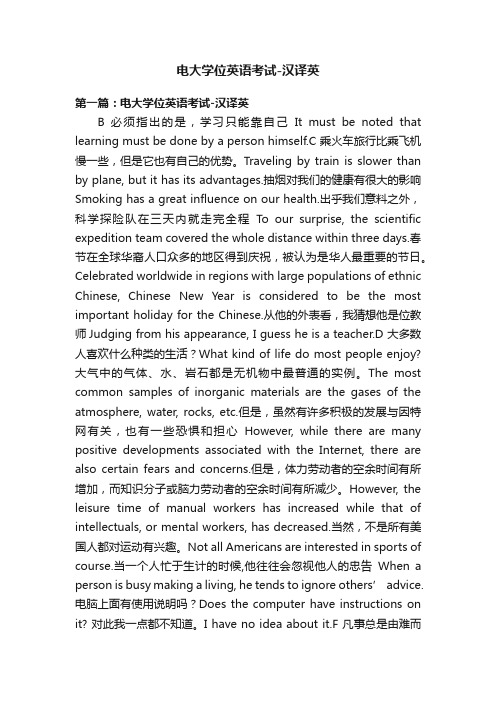
电大学位英语考试-汉译英第一篇:电大学位英语考试-汉译英B 必须指出的是,学习只能靠自己It must be noted that learning must be done by a person himself.C 乘火车旅行比乘飞机慢一些,但是它也有自己的优势。
Traveling by train is slower than by plane, but it has its advantages.抽烟对我们的健康有很大的影响Smoking has a great influence on our health.出乎我们意料之外,科学探险队在三天内就走完全程To our surprise, the scientific expedition team covered the whole distance within three days.春节在全球华裔人口众多的地区得到庆祝,被认为是华人最重要的节日。
Celebrated worldwide in regions with large populations of ethnic Chinese, Chinese New Year is considered to be the most important holiday for the Chinese.从他的外表看,我猜想他是位教师Judging from his appearance, I guess he is a teacher.D 大多数人喜欢什么种类的生活?What kind of life do most people enjoy? 大气中的气体、水、岩石都是无机物中最普通的实例。
The most common samples of inorganic materials are the gases of the atmosphere, water, rocks, etc.但是,虽然有许多积极的发展与因特网有关,也有一些恐惧和担心However, while there are many positive developments associated with the Internet, there are also certain fears and concerns.但是,体力劳动者的空余时间有所增加,而知识分子或脑力劳动者的空余时间有所减少。
汉译英——北航英文二学位
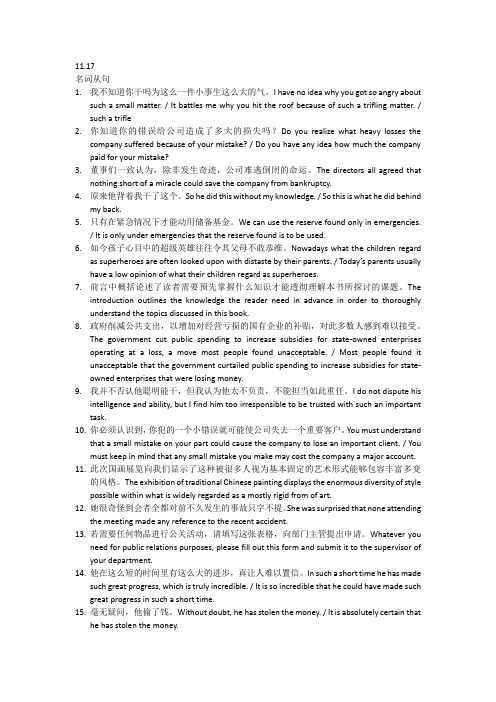
11.17名词从句1.我不知道你干吗为这么一件小事生这么大的气。
I have no idea why you got so angry aboutsuch a small matter. / It battles me why you hit the roof because of such a trifling matter. / such a trifle2.你知道你的错误给公司造成了多大的损失吗?Do you realize what heavy losses thecompany suffered because of your mistake? / Do you have any idea how much the company paid for your mistake?3.董事们一致认为,除非发生奇迹,公司难逃倒闭的命运。
The directors all agreed thatnothing short of a miracle could save the company from bankruptcy.4.原来他背着我干了这个。
So he did this without my knowledge. / So this is what he didbehind my back.5.只有在紧急情况下才能动用储备基金。
We can use the reserve found only in emergencies. /It is only under emergencies that the reserve found is to be used.6.如今孩子心目中的超级英雄往往令其父母不敢恭维。
Nowadays what the children regardas supe rheroes are often looked upon with distaste by their parents. / Today’s parents usually have a low opinion of what their children regard as superheroes.7.前言中概括论述了读者需要预先掌握什么知识才能透彻理解本书所探讨的课题。
学位英语汉译英补充练习2特殊句型和时态

※14. not…until… 直到。。。才。。。
特殊句型
15. There is/are…这里有。。。 ※16. If … 条件句(如果。。。)
(主句将来时,条件句用一般现在时)
17. nothing … but… 除了。。。无 事可做。。。
85 83 81 81、82 84 84 84 85 82 81、84 82
85.It's very important for the young people to think independently(by themselves). / to have the abilities of thinking independently.
过去完成时
例如:He had started to clean the room before I got there.
He thought he had got enough supply.
一般将来时
例如:I’m going to visit New York this summer.
84. They didn't make me join their team / group until the late of December.
82. He didn't begin to study English until he was 27 years
old.
83. He read the book so carefully that he didn't hear the telephone ring.
It will rain. 被动语态
成人学位英语考试英汉互译练习题(二).doc
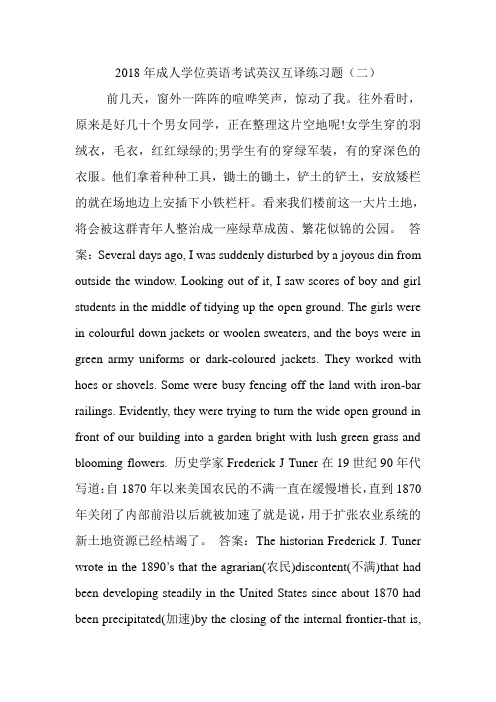
2018年成人学位英语考试英汉互译练习题(二)前几天,窗外一阵阵的喧哗笑声,惊动了我。
往外看时,原来是好几十个男女同学,正在整理这片空地呢!女学生穿的羽绒衣,毛衣,红红绿绿的;男学生有的穿绿军装,有的穿深色的衣服。
他们拿着种种工具,锄土的锄土,铲土的铲土,安放矮栏的就在场地边上安插下小铁栏杆。
看来我们楼前这一大片土地,将会被这群青年人整治成一座绿草成茵、繁花似锦的公园。
答案:Several days ago, I was suddenly disturbed by a joyous din from outside the window. Looking out of it, I saw scores of boy and girl students in the middle of tidying up the open ground. The girls were in colourful down jackets or woolen sweaters, and the boys were in green army uniforms or dark-coloured jackets. They worked with hoes or shovels. Some were busy fencing off the land with iron-bar railings. Evidently, they were trying to turn the wide open ground in front of our building into a garden bright with lush green grass and blooming flowers. 历史学家Frederick J Tuner在19世纪90年代写道:自1870年以来美国农民的不满一直在缓慢增长,直到1870年关闭了内部前沿以后就被加速了就是说,用于扩张农业系统的新土地资源已经枯竭了。
成人学位英语英译汉答题方法:选用恰当时态
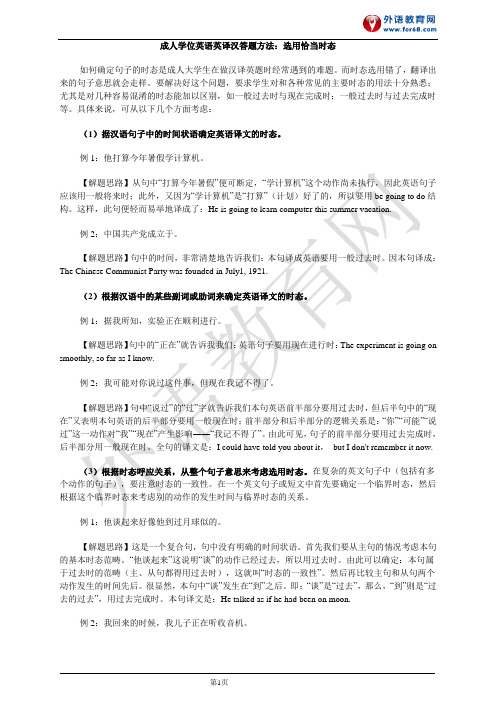
成人学位英语英译汉答题方法:选用恰当时态如何确定句子的时态是成人大学生在做汉译英题时经常遇到的难题。
而时态选用错了,翻译出来的句子意思就会走样。
要解决好这个问题,要求学生对和各种常见的主要时态的用法十分熟悉;尤其是对几种容易混淆的时态能加以区别,如一般过去时与现在完成时;一般过去时与过去完成时等。
具体来说,可从以下几个方面考虑:(1)据汉语句子中的时间状语确定英语译文的时态。
例1:他打算今年暑假学计算机。
【解题思路】从句中“打算今年暑假”便可断定,“学计算机”这个动作尚未执行,因此英语句子应该用一般将来时;此外,又因为“学计算机”是“打算”(计划)好了的,所以要用be going to do结构。
这样,此句便轻而易举地译成了:He is going to learn computer this summer vacation.例2:中国共产党成立于。
【解题思路】句中的时间,非常清楚地告诉我们:本句译成英语要用一般过去时。
因本句译成:The Chinese Communist Party was founded in July1, 1921.(2)根据汉语中的某些副词或助词来确定英语译文的时态。
例1:据我所知,实验正在顺利进行。
【解题思路】句中的“正在”就告诉我我们:英语句子要用现在进行时:The experiment is going on smoothly, so far as I know.例2:我可能对你说过这件事,但现在我记不得了。
【解题思路】句中“说过”的“过”字就告诉我们本句英语前半部分要用过去时,但后半句中的“现在”又表明本句英语的后半部分要用一般现在时;前半部分和后半部分的逻辑关系是:“你”“可能”“说过”这一动作对“我”“现在”产生影响――“我记不得了”。
由此可见,句子的前半部分要用过去完成时,后半部分用一般现在时。
全句的译文是:I could have told you about it,but I don't remember it now.(3)根据时态呼应关系,从整个句子意思来考虑选用时态。
学士学位英语考试英汉翻译练习题

学士学位英语考试英汉翻译练习题The Olympic Games are the greatest festival of sports in the world. 1) Every four years, a hundred or more countries send their best sportsmen to compete for the highest honors in sport. As many as 6,000 people take part in over 20 sports. For the winners, there are gold medals and glory. But there is honor, too, for all who compete, win or lose. That is in spirit of the Olympics--- to take part is what matters.The Olympic Games always start in a bright color and action. The teams of all the nations parade in the opening ceremony and march round the track. The custom is for the Greek team to march in first . For it was in Greece that the Olympics began. 2) The team of the country where the Games are being held---the host country ----marches in last. The runner with the Olympic torch then enters the stadium and lights the flame.3) A sportsman from the host country takes the Olympic oath on behalf of all the competitors. The judges and officials also take an oath. After the sportsmen march out of the stadium, the host country puts on a wonderful display.The competitors begin the next day. There are usually more than twenty sports in the Games. The rule is that there must be at least fifteen. The main events are in track and field , but it is a few days before these sports start. Each day the competitors take part in a different sport ---riding, shooting, swimming, and cross-country running. Points aregained for each event. 4) Medals are awarded for the individual winners and for national teams. 5) More and more women are taking part in the games. They first competed in 1900, in tennis and golf, which are no longer held in the Olympics. Women’s swimming events were introduced in 1912. But it was not until 1928 that there were any track and field events for women. Now they compete in all but half a dozen of the sports. In horse riding, shooting, and boat racing, they may compete in the same events as the men.参考答案:1)每隔四年,100多个国家选送他们秀的运动员云集于此,争夺世界体育比赛中的荣誉。
学位英语汉译英

汉译英第一部分1.玛丽把小孩委托给邻居照看,然后匆忙跑回电影院去找遗忘在那里的手提包。
2.对于汤姆来说,金钱和权力并不重要。
3.在面试开始前,我心中很有些忐忑不安。
4.事故的原因主要在于司机的不小心。
5.他靠给几家人做园丁谋生。
答案:1. Leaving her kid to the care of her neighbor, Mary hurried back to the cinema to look forher handbag she had left there.2. Both money and power mean nothing to Tom.3. Before the interview began, there were many butterflies in my stomach.4. The cause of the accident lies mainly in the driver’s carelessness.5. He lives on serving as the gardener of several families.1. ______________________________________________________________(为了帮助她,凡是我能想到的都做了), I don’t know what else to do.2. There are, _____________________________________________________(要是你不介意我这样说的话), several problems with this idea of yours.3. The driver admitted that ________________________________________________(他不但没有上保险), but he didn’t have a driving license either.4. ________________________________________________________________(这两个人中不管哪个偷了她的钱包), she was determined to find out.5.________________________________________________________(你应该试试照我建议的那样做). I’m sure you’d find it much easier.答案:1.I’ve done everything I can think of to help her, I don’t know what else to do.2.There are, if you don’t mind me saying so, several problems with this idea of yours.3.The driver admitted that not only was he not insured, but he didn’t have a driving licenseeither.4.Whichever of the two men had stolen her purse, she was determined to find out.5.You should try doing the way I suggested. I’m sure you’d find it much easier.第二部分1. 我已得知事故的详情。
学位英语试题(时态、语态、语气)练习
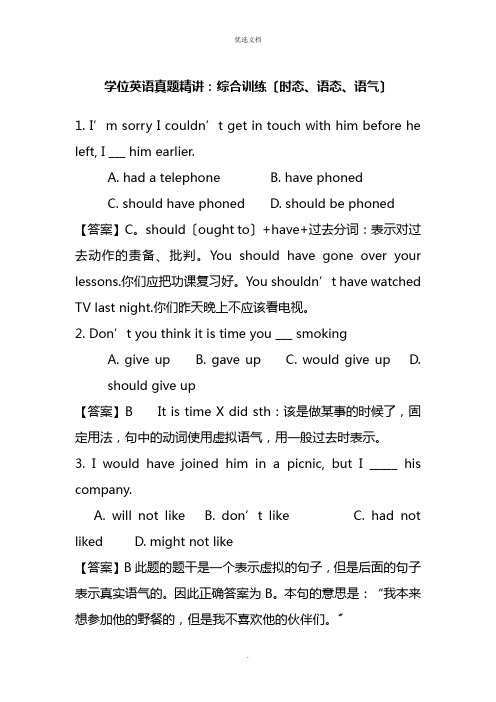
学位英语真题精讲:综合训练〔时态、语态、语气〕1. I’m sorry I couldn’t get in touch with him before he left, I ___ him earlier.A. had a telephoneB. have phonedC. should have phonedD. should be phoned 【答案】C。
should〔ought to〕+have+过去分词:表示对过去动作的责备、批判。
You should have gone over your lessons.你们应把功课复习好。
You shouldn’t have watched TV last night.你们昨天晚上不应该看电视。
2. Don’t you think it is time you ___ smokingA. give upB. gave upC. would give upD.should give up【答案】B It is time X did sth:该是做某事的时候了,固定用法,句中的动词使用虚拟语气,用一般过去时表示。
3. I would have joined him in a picnic, but I _____ his company.A. will not likeB. don’t likeC. had not likedD. might not like【答案】B此题的题干是一个表示虚拟的句子,但是后面的句子表示真实语气的。
因此正确答案为B。
本句的意思是:“我本来想参加他的野餐的,但是我不喜欢他的伙伴们。
〞4. I wish you ___ to me before you went and bought that car.A. spokeB. will speakC. was going to speakD. had spoken【答案】D 句中before后面的动作时过去时态,说明已经发生了,故B错;因“我期望〔I wish〕〞发生的动作应该发生在before从句中的动作之前,所以选过去完成时态,故D正确。
电大学位英语学习-汉译英解题

◆写作概述1、复杂句拆成简单句。
2、写简单句时,先找动词或中心词。
动词-- 主语+动词-- 主语+动词时态-- 主语+动词+修饰词中心词–添加修饰●句子中抓住动词、中心意思,然后添加修饰词。
1)形容词修饰名词- 约翰接待了一位蛮不讲理的顾客。
John received a rude and unreasonable customer.2)副词修辞形容词、副词、动词- 他的意见完全不同。
(修饰形容词)He has a quite different opinion.- 乔治跑得很快。
(修饰副词)George runs very fast.- 简向上看去。
(修饰动词)Jane looked up. (我看—向上)- 他立即站了起来。
(修饰动词)He stood up immediately.(他站—向上—立即地)3)介词短语(介词加名词)当修饰词,修饰动词等- 我着大街走。
I walked along the street. (我走—沿大街)- 托比从树上跳下来。
Toby jumped off the tree. (他跳—从树上)- 海伦把书放回书架上。
Helen put the book back on the shelf.(他放书—回—书架上)●一个句子至少要有一个动词。
没有实义动词则必须添加虚义动词。
- 文件在桌上。
The paper is on the table.- 这些花很美。
The flowers are beautiful.- 这不可能。
This is impossible.●动词(种类)1 分类一1)及物vt + 名词n ----- 例find. take,bring,join不及物vi +介词+ 名词n ----- 例look, go,walk, die,arrive正常:动词+ 名词动词+(名词)+ 副词特殊:动词+ 形容词动词+ 名词+ 形容词2)动词+ 形容词adja.be动词——be,get,turn,become,grow,keep, stay, etc(是、变得、保持)b.感官动词——sound,look,seem,feel,taste,smellc. 宾补动词(动词+ 名词+ 形容词)let, make,think,prove,find,cut,paintThe news made us very excited. 消息使得大家很激动。
学位英语汉译英补充练习1形容词比较级与固定短语
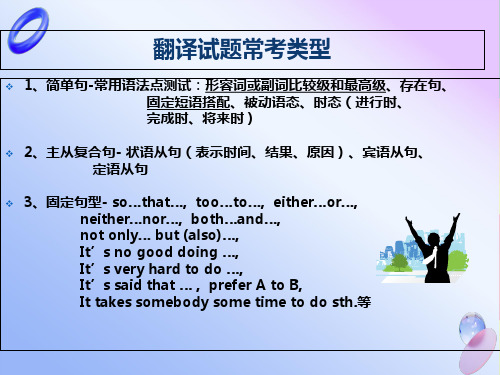
Practice
❖ 1.本书跟那本书一样有趣。 ❖ This book is ____ ___ ___ that one. ❖ as interesting as ❖ 2.你游泳没有你弟弟好。 ❖ You can’t swim ___ ___ ___ your brother. ❖ as/so well as ❖ 3.这个故事比另一个有趣的多。 ❖ This story is __ __ __ than that one. ❖ much more interesting
翻译试题常考类型讲解与举例
❖ 形容词或副词的比较级和最高级 ❖ 常考形容词和副词 ❖ only 仅仅,只 ❖ smart聪明的,时髦的 ❖ much许多(修饰不可数名词) ❖ bad坏的 ❖ well好的(身体好,学习好) ❖ high高的(修饰事物) ❖ early早的 ❖ heavy重的,大雨,大雪 ❖ light轻的,浅颜色的 ❖ old老的,旧的 ❖ interested感兴趣的(主语是人)
young年轻的 wrong错误的 good好的 little少的,小的(年龄),几乎没有 popular受欢迎的,流行的 excited激动的(主语是人)
late晚的,迟的 small小的(外型) difficult难的
satisfied满意的
❖ new新的 ❖ different不同的 ❖ same相同的 ❖ slow慢的 ❖ nice好的 ❖ dark黑暗的 ❖ long长的,长久的 ❖ clever聪明的 ❖ scarce少见的 ❖ significant重大的 ❖ soon 很快地(时间)
❖ 5.The more passions (激情 we have, the more happiness
❖ we are likely(可能的) to experience(体验). ❖ 我们的激情越多,我们有可能体验到的快乐就越多。
【优选版】汉译英练习时态综合PPT资料

现在进行时
▪ 现在进行时是由助动词be加现在分词 构成的。主要表示现在或现时刻这一阶段 正在进行的动作,有时候还用来表示一个 最近按计划或安排要进行的动作。
拂晓前他们已经走完了大半路程。
d-或ed;其他动词参阅不规则动词变化表, 该时 had studied English D.
【解析】考察学生对将来完成时态的用法。 Mary ____________ a dress when she cut her finger.
态主要表示过去某时发生的动作或情况。 现在进行时常与always,continually, constantly等作状语的频度副词连用,强调某一反复性动作,表示赞美、讨厌、惊奇、不满等感情
一般现在时
▪ 一般现在时主要由动词原形表示,但 第三人称单数后要加词尾-s,另外be 和 have要根据人称的变化使用特殊的形式。 一般现在时主要表示经常性的动作或存在 的状态,还可用来表示普遍真理。
▪ 长江发源于青海。 ▪ 行动胜于言辞。 ▪ The Yangtze rises in Qinghai . ▪ Actions speak louder than words.
过去完成进行时由had been加现在分词构成,表示过去某一时刻之前开始的动作或状态一直延续到过去某一时刻。
▪ It’s a pity that you did not go to the movie. 由于英语属于曲折变化的语言,其动词时态的变化要通过词的曲折词形变化来体现的,因而也就有了现在式、过去式、过去分词式三
in a physics labatory. ▪ They took us to see the chemical fibre mill that
they were building. ▪
学位英语 特殊句式

students became more interested in the lessons.
A. saved was teachers’ energy B. was teachers’ energy saved C. teachers’ energy was saved D. was saved teachers’ energy 答案: B 解析: 句意为:计算机应用于教学。结果,不仅教师节省能量,而且学生对课程更 感兴趣。考查“not only...but also...”, 放在句首作状语,句子则进行部分倒装。 前一部分倒装,后一部分不倒装。 9.So sudden _that the enemy had no time to escape. A. did the attack B. the attack did C. was the attack D. the attack was 答案: C 解析: 考查倒装,so ..that.., such ..that..的句子结构中,若 so, such 和与 其所修饰的词置于句首,实行部分倒装,又 sudden 是形容词,作表语,所以选 C。 10.He must be helping the old man to water the flowers, ? A. is he B. isn’t he C. must he D. mustn’t he 答案: B 解析: 考查反意疑问句。陈述句中的谓语中虽有情态动词 must,但此处 must 表示 对正在进行的动作进行推测,将其不看作情态动词。而 must 后有助动词 be,故反意疑 问句根据助动词 be 来构成,选 B。 11.Little about her own safety, though she was in great danger herself. A. did Rose care B. Rose did care C. Rose does care D. does Rose care 答案: A 解析: little 是具有否定意义的词,位于句首时句子用部分倒装句,选 A。 12.—I wonder _ you’ll water this kind of flower. —Every other day. A. how often B. how long C. how soon D. how much 答案: A 解析: 相似疑问词的区别。根据答语 Every other day 可知对方问的是多久浇一次 这种花。how often 问频率,符合题意。 13.Not until I came home last night _ to bed. A. Mum did go B. did Mum go
2023年学位英语考试复习语法

1.一般现在时可以代替将来时,用于时间和条件状语从句中。
例如:1)Return the book immediately to the library as soon as you __A___ it.A. finishB. are finishedC. have finishedD. are finishing2)Please be sure to telephone me the next time you _D____.A. will comeB. would comeC. shall comeD. come2.在“This is the first time…”结构中,后面的从句用现在完毕时。
句子开头也可以用it代替this例:This is the first time that I have met Jane.3.在“It/This is +形容词最高级+名词后面的从句中,用现在完毕时。
”例:This is one of the best books _A____ on the subject.A. that have ever been writtenB. which have ever been writtenC. that has ever been writtenD. whatever have been written4.在“It is/has been+时间段+since…后边用过去时。
”例:It has been twenty years since I left my hometown.5.在“no sooner…than”和“hardly… when…”结构中,主句部分用过去完毕时,从句部分用过去时。
例如:1)I had no sooner returned than he called.2)We had hardly begun when we were told to stop.6.在“It is (high) time后边的从句中用过去时。
- 1、下载文档前请自行甄别文档内容的完整性,平台不提供额外的编辑、内容补充、找答案等附加服务。
- 2、"仅部分预览"的文档,不可在线预览部分如存在完整性等问题,可反馈申请退款(可完整预览的文档不适用该条件!)。
- 3、如文档侵犯您的权益,请联系客服反馈,我们会尽快为您处理(人工客服工作时间:9:00-18:30)。
82. He didn't begin to study English until he was 27 years
old.
83. He read the book so carefully that he didn't hear the telephone ring.
85.It's very important for the young people to think independently(by themselves). / to have the abilities of thinking independently.
83. This work is too hard / difficult for you to do / finish.
20.(not) as/so…as… 和。。。不一样
真题练习P95
2003.11 2004.4 2004.11 2006.4 2006.11 2007.4 2008.4 2008.11 2009.11 2010.5 2010.11
85 83 81 81、82 84 84 84 85 82 81、84 82
He worked so late that he missed (错过)the last bus.
He worked too late to catch(追 赶上)the last bus.
2.我或他将不得不处理这件棘手的事。
Either he or I will have to deal with(处理)this urgent(棘手的) thing.
The manager kept silent until the meeting ended.
82. He made a long distance call to me as soon as he got to / arrived in Shanghai.
81. This morning he got up so late that he didn't catch the train.
3.我和他都不会去处理这件棘手的事。
Neither he nor I will deal with this urgent thing.
特殊句型
5. both…and…两者都。。 6. not only… but (also)…,不
但。。。而且。。。 ※7. It’s no good/use doing
11.It is + adj.+for sb. to do sth. 对某人来说,做某事很。。。
12. not…anymore = not ...any longer 不再
※13. prefer A to B, 宁可。。。也不。。。
※14. not…until… 直到。。。才。。。
特殊句型
81. As we all know, learning is very important for everyone's growth.
Everyone knows it's very important for a person to study.
81. He got up very early to catch the first bus.
It’s no good calling the customer now. It’s very hard for me to change his
mind(改变他的想法). It’s said that he bought(购买) a new
car this month.
特殊句型
※10. It takes somebody some time to do sth. 花某人一些时间做某事
翻译试题常考类型讲解与举例
特殊句型 ※1. so/such…that…,如
此。。。以至于 2. too…to…, 太。。。以至于
不能。。。 ※3. either…or…,或者。。。
或者。。。 ※4. neither…nor…, 既不
是。。。也不是。。。
1例.他工如作:得太晚,以至于错过了最后一班公共汽车。
…, 做。。。没有用处(好处)
8. It’s very hard to do …id that … ,据说。。。
例如:
Both my boss and I couldn’t understand what the customer(顾客)said.
I am not only a good mother, but also a hardworking clerk(辛勤的职员).
15. There is/are…这里有。。。 ※16. If … 条件句(如果。。。)
(主句将来时,条件句用一般现在时)
17. nothing … but… 除了。。。无 事可做。。。
18. as long as ……只要。。。 19. …as soon as… 一。。。就。。。
(主句将来时,条件句用一般现在时)
84. We will tell / inform you as soon as we come to a conclusion. / get a result.
85. The manager didn't say a word until the meeting ended/ was over.
82. He didn't change his mind
until yesterday evening / last night.
84. If it is crowded everywhere, travelling will make people unhappy.
84. They find it impossible to finish this work before 6:00pm.
